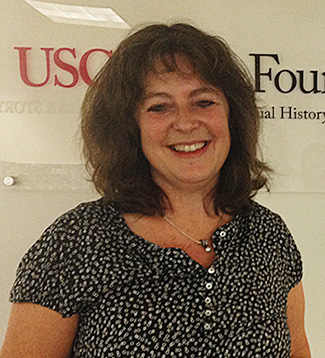
Madelon Bino
Madelon Bino and her husband Raoul weren’t quite ready to leave USC Shoah Foundation’s office in Los Angeles when the monthly public visit they attended on July 23 concluded.
Instead, they headed straight for a computer as intern Sebastian Goditsch showed them how to access the Visual History Archive and start watching testimony. After just a few minutes, Madelon pointed at the screen and smiled.
“That’s one of the interviews I did,” she said.
The Binos are from the Netherlands and were visiting Los Angeles on holiday, but they couldn’t leave the city without stopping by USC Shoah Foundation. Madelon conducted about 25 interviews of Holocaust survivors in the 1990s for the then-titled Survivors of the Shoah Visual History Foundation, and was curious to visit the current facility at the USC campus and find out more about the Institute’s work today.
When she became an interviewer for the Shoah Foundation, Madelon was a social worker and had little scholarly knowledge of the Holocaust. Her parents both survived the Holocaust as hidden children and lost their fathers, and didn’t talk much about their experiences while Madelon was growing up. But as soon as she heard about the project to interview survivors she knew right away she wanted to do it – even though she was busy with her young children and career of her own.
“Like a lot of second generation [survivors], you can’t talk about [the Holocaust] with your family in a normal way, and maybe that’s why I wanted to do it,” Madelon said. “I had a lot of questions and it’s easier to ask a stranger than your own family.”
Madelon said the testimonies showed her just how little she actually knew about the Holocaust. In her interviews heard many incredible stories and grew to admire how strong the survivors were. Despite the horrible things that had happened to them, they all went on to be very successful both personally and professionally.
She kept in touch with all of her interviewees after the testimonies were done and developed a close bond with them throughout the process.
“It’s strange to say but I almost fell in love with everybody I interviewed. You get a very special relationship with these people because it gets so intimate,” she said.
The experience really was life changing, Madelon said. She was so moved by the testimonies and meeting the survivors that she wanted to stay involved in the cause. Today, she is the director of the Jewish community in Amsterdam.
On the public visit to the Institute, Madelon got to learn about how USC Shoah Foundation is preserving the testimonies and using them to teach students around the world about the consequences of genocide and intolerance. She hopes to show testimony to teens and young adults in Amsterdam to address growing antisemitism in their community.
USC Shoah Foundation has changed a lot since Madelon conducted testimonies in the Netherlands nearly 20 years ago, and that’s a good thing. Though Holocaust testimonies aren’t being collected like they were in the early days, the Institute’s work is far from over.
“I was afraid we would find all the tapes somewhere in a closet and that’s it, but it’s not,” Madelon laughed. “It’s very alive and everybody is very committed who works here and it’s very impressive.”